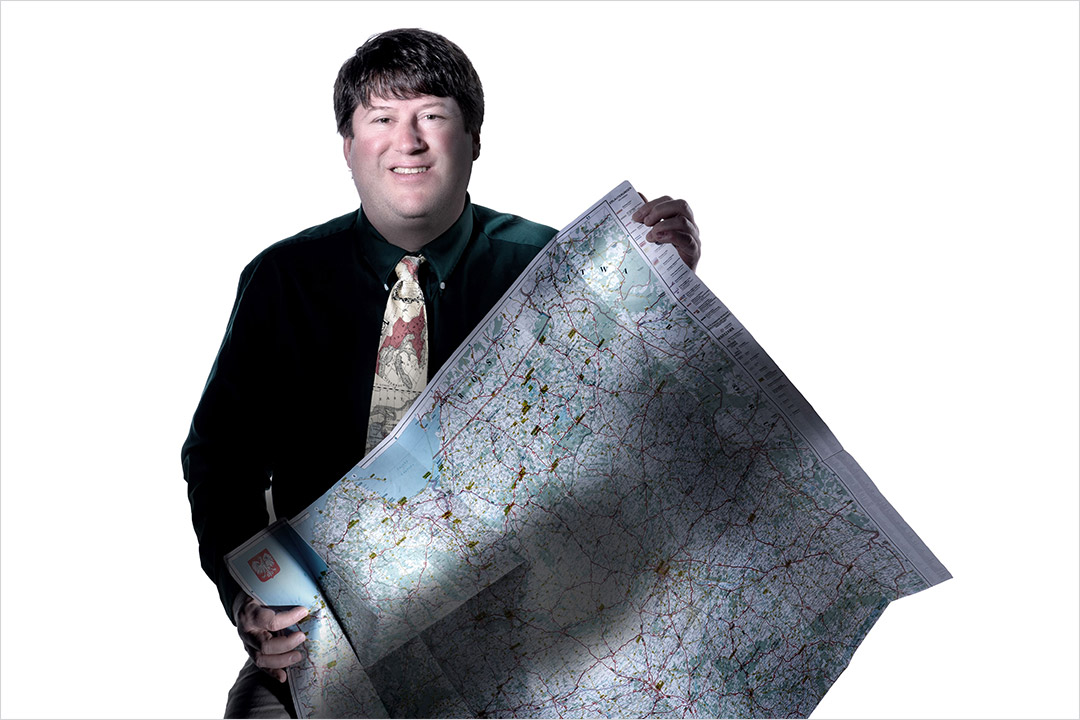Professor Brian Tomaszewski uses spatial data science to help Ukrainian refugee crisis in Poland
Fulbright U.S. Scholar Award will fund research and education trip for computing professor
Carlos Ortiz
Professor Brian Tomaszewski received a prestigious Fulbright U.S. Scholar Award to conduct a research and education collaboration at the Poznań University of Technology. His work will use spatial data science to help Ukrainian refugees in Poland.
Professor Brian Tomaszewski received a prestigious Fulbright U.S. Scholar Award to conduct spatial data science research related to the forced displacement of Ukrainian refugees in and out of Poland.
Using his combined expertise in geographic information science (GIS) and technology and refugee situations, Tomaszewski hopes to gain a better understanding of the crisis and improve the lives of people involved. In addition to research, Tomaszewski is teaching a spatial data science class at the Poznań University of Technology (PUT), using the Ukrainian refugee situation as a central case study.
Meet the other Fulbright Scholars
Biomedical engineering graduate Maggie Brooks sets sail for UK as Fulbright Scholar
Graduate Sophia Williams wins Fulbright award to pursue graduate education abroad
Professor Michael Barbosu to spend fall in Romania researching and teaching mathematical modeling
“When the conflict started, I immediately looked into ways that I could offer my particular skill sets and abilities to help,” said Tomaszewski, who is a faculty member in RIT’s Golisano College of Computing and Information Sciences. “I am drawn to humanitarian research work and I’ve found that the place and the context really matter—you need to go there and engage with people.”
The Fulbright Award will allow Tomaszewski to live in Poland from October to July, where he will study one of the largest humanitarian crises in modern times.
According to the United Nations, since Russia invaded Ukraine in 2022, nearly 1.4 million Ukrainian refugees have registered for temporary protection in neighboring Poland. While refugees are returning home, many will remain in Poland for years to come. For refugees, Polish leaders, and humanitarian aid officials, this leaves unanswered questions on how to best support refugees.
With the project, Tomaszewski aims to derive insight from aspects of data that are distinctly spatial. This could include data from cell phone GPS tracking, remote sensing imagery, and location references in text, among others.
Tomaszewski plans to study trends and patterns related to the specific regions that Ukrainians are coming from when entering Poland. He’ll also observe where the refugees are settling and why. He hopes to conduct refugee interviews to gain a better understanding of their experiences.
From the data, researchers can generate map-based depictions of refugee locations and movements. Tomaszewski also plans to use natural language processing of open source news media and social media to identify location-based patterns and movements of Ukrainians.
“This will also give us a good opportunity to explore geospatial ethics and the implications of collecting and processing this kind of data,” said Tomaszewski.
At PUT, Tomaszewski will teach an introductory course on spatial data science, showing how geospatial data visualized in maps and other formats can provide insight. He plans to tie in his past experiences working with the United Nations High Commissioner for Refugees and with refugees in Rwanda and Jordan to his Fulbright research in Poland. He would also like to implement a GIS technology teaching program to help Ukrainian refugees build careers and livelihoods in the industry.
On a personal level, Tomaszewski sees his Fulbright project as a return home. His great-great grandfather left Prussian-occupied Poland in 1883 as a refugee, seeking a better life in the U.S.
“I’m excited for this opportunity to help Ukrainian refugees, while also enhancing Polish science and technology education and research,” said Tomaszewski.







